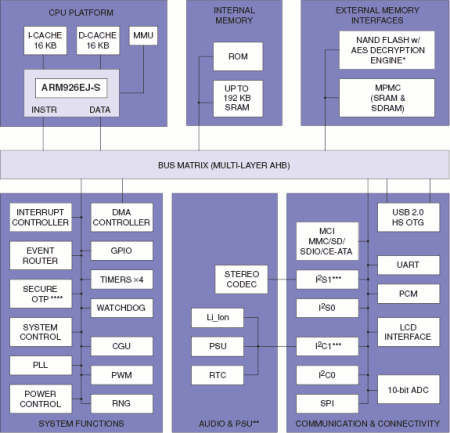ARM9 microcontroller gains Linux development support
Oct 15, 2009 — by Eric Brown — from the LinuxDevices Archive — 6 viewsTimesys announced that it is providing the first commercial Linux development support for NXP Semiconductors' LPC313x series of ARM9-based microcontrollers. The “LinuxLink for LPC313x” offering enables developers to build custom Linux-based products on the 180MHz ARM926EJ-S-based processor, says the company.
A member of the ARM9-based LPC3000 family, the LPC313x line of chips is touted by NXP for its low cost, low power consumption, and small footprint in applications requiring USB connectivity. The microcontroller supports numerous consumer and industrial applications ranging from remote controls and language translators to bar code readers and medical diagnostics devices, says NXP.
The LPC313x is equipped with a 32-bit ARM926EJ-S core clocked at 180MHz, with dynamic clock gating and scaling, says NXP. The chip supports up to 192KB of SRAM on the LPC3131 version and 96KB on the LPC3130. Both versions offer a NAND flash controller with 8-Bit ECC, and an MMC/SD/SDIO/CE-ATA memory card interface, says the company. Peripheral support is said to include High Speed USB 2.0 OTG with on-chip PHY, serial interfaces, and an LCD interface.

NXP LPC31x block diagram; the AES decryption function and Audio & PSU block (lower middle) are not available with the LPC313x.
(Click to enlarge)
LinuxLink for LPC313x
LinuxLink customers can now use the latest GNU-based toolchains enabled with uClibc and glibc libraries optimized for the LPC313x's ARM926EJ-S core, says Timesys. The initial release is based on the 2.6.28 Linux kernel, and is said to integrate drivers for the full range of LPC3130 reference board peripherals.
Using the LinuxLink development platform and online service, customers can select from hundreds of packages and middleware for a custom root file-system. Newer versions of Linux components, including the Linux kernel, toolchain, packages, and middleware, will be available in LinuxLink as they become available from the open source community and from NXP, says Timesys.
Linux developers can use both the online LinuxLink "Factory" build system or the desktop-hosted version of LinuxLink. Customers also have access to commonly used debugging tools within the Eclipse-based TimeStorm IDE, as well as documentation, and technical support from Timesys engineers. Timesys also provides extra-cost professional development services.
Stated Geoff Lees, VP and GM, microcontroller business at NXP, "The LPC313x family is gaining broad acceptance today in the embedded space due to its excellent price performance ratio in the ARM9 space. Timesys now provides a commercially supported Linux BSP for the LPC313x that will enable our customers to get their products to market faster."
Availability
Timesys is offering limited-time free trial access to LinuxLink, to quickly configure, build and evaluate embedded Linux on the LPC3130 platform. More information may be found here, and developers should enter promotion code PRLPC3130 when completing the form.
Additional information about LinuxLink subscriptions for the NXP platform can be found here, and more on the LPC313x family of processors may be found at NXP, here.
This article was originally published on LinuxDevices.com and has been donated to the open source community by QuinStreet Inc. Please visit LinuxToday.com for up-to-date news and articles about Linux and open source.